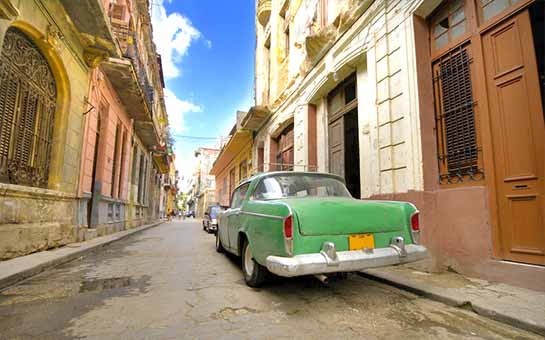Given its temperate climate, beautiful beaches, scenic views, and close proximity to the United States, one would think that Cuba would be swarming with tourists year-round. However, ever since the U.S. severed diplomatic relations with Cuba in 1961, U.S. citizens have been restricted from traveling there. It’s only been in the last 20 years that these restrictions have slowly started to lift—at first, for Americans, that meant submitting an application and waiting for a decision to be made on a case-by-case basis. Diplomatic relations between the countries resumed in 2015, but travel restrictions and sanctions remain in a state of flux.
Cuba COVID-19 Restrictions
It has become relatively easier for Americans to visit Cuba in recent years. In the wake of the coronavirus pandemic, those traveling to Cuba—including Cubans living abroad who are visiting temporarily—are required to purchase COVID-19 travel medical insurance that covers coronavirus-related expenses and that lasts the full duration of stay in the country.
As of April 6, 2022, Cuba has ended its COVID-related entry requirements. This means there are no longer requirements for pre-flight COVID testing or self-isolation. However, there is one important caveat to these restrictions ending. Cuban authorities have the power to perform random PCR tests on any visitor arriving in Cuba. If the visitor tests positive, they will be required to enter a mandatory quarantine at a government facility or hospital for 14 days at the traveler's expense.
Even if you test yourself voluntarily for COVID-19 before traveling to Cuba and the test comes back negative, you could contract the disease from someone else on your flight. If this happens and you are subject to random testing, you could be on the hook for an expensive quarantine period.
Traveling to Cuba
Travel to Cuba for tourist activities is still not permitted. Visitors must have a valid reason related to one of the 12 categories listed below under a general license. This license allows people under U.S. jurisdiction—primarily U.S. citizens and U.S. permanent residents—to go to Cuba freely for certain approved reasons, meaning no paperwork. Everyone can use this general license, provided that they keep records for at least five years and commit to a full-time schedule in an activity related to an approved category.
Travel to Cuba is permitted for activities related to the following 12 categories: (1) family visits; (2) official business of the U.S. government, foreign governments, and certain intergovernmental organizations; (3) journalistic activity; (4) professional research and professional meetings; (5) educational activities; (6) religious activities; (7) public performances, clinics, workshops, athletic and other competitions, and exhibitions; (8) support for the Cuban people; (9) humanitarian projects; (10) activities of private foundations or research or educational institutes; (11) exportation, importation, or transmission of information or information materials; and (12) certain authorized export transactions.
Anyone who wants to travel to Cuba for reasons not permitted under the general license must obtain a specific license from the Office of Foreign Assets Control (OFAC) of the U.S. Department of the Treasury.
Cuba has its own requirements for entry. Visitors must have a valid passport and obtain a visa from the Cuban Embassy. Also, effective May 1, 2010, travel medical insurance is required for entry into Cuba. Such travel medical insurance must cover medical emergencies, repatriation of remains, and emergency medical evacuation. In order to get a visa to Cuba, you will be required to provide the proof of travel insurance. When you arrive at the airport or seaport, you will be asked for the proof of such insurance.
Be aware that many insurance policies will not cover you while in Cuba. Be certain that the one you purchase does. It is extremely important that you follow the legal procedures in order to get travel medical insurance coverage for your travel to Cuba.
The CDC has listed a few vaccines they require or recommend before traveling to Cuba. Required are the measles vaccine and routine vaccines (MMR, diphtheria-tetanus-pertussis, chickenpox, polio, and a yearly flu shot). Recommended are vaccines for typhoid and hepatitis A (to protect against contaminated food or water), rabies, and hepatitis B.
Due to the trade embargo, no medical facility in Cuba will accept U.S.-based insurance cards, credit cards, or checks. Therefore, medical services must be paid for in cash. If you need medical services, you should be prepared to pay out of pocket and file for reimbursement by submitting the receipts and the claim form. However, for an emergency medical evacuation—which could potentially require more cash than you have on hand—the insurance company can arrange for the evacuation through a network of carriers outside the U.S. who would be able to service an insured accordingly.
The island of Cuba lies in the path of many hurricanes, especially during Atlantic hurricane season (typically, June 1 – Nov. 30 of each year). The country has experienced more than 35 hurricanes since the year 2000. If you plan to visit during that time of year, be aware of any severe weather watches or warnings, and follow all designated safety procedures if a hurricane should strike while you’re there.
Any number of things that require medical care can happen while on your trip to Cuba, so be prepared for them. Take a look at the plans below, as they can provide coverage in Cuba. Protect your greatest asset—YOU!

